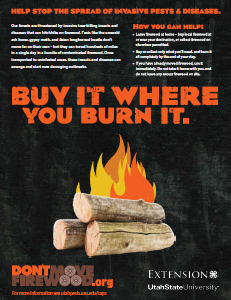Guest blog by Cami Cannon, Publication Assistant at USU Cooperative Extension Utah Pests
Although Utah is known more for its red rock than for its forests, a third of the state is covered with over 15 million acres of beloved trees. From the Ponderosa pines scattered through Bryce Canyon National Park to the lodgepole pine forests of the Uintas, there are millions of trees that provide critical benefits and are loved by tourists and locals alike. Therefore, the state of Utah is eager to prevent invasive insects and diseases from attacking forested areas. The most concerning pests for Utah’s natural and urban forests are the emerald ash borer, spongy moth, and Asian longhorned beetle.
The Utah Plant Pest Diagnostic Lab (UPPDL) at Utah State University conducts workshops on invasive species, targeting forestry and industry personnel. This spring, they are also in the process of creating a First Detector program for Utah, targeting Master Gardeners and extension staff, and hope to include (in the future) volunteer activities to assist with their prevention and detection efforts. As part of this program, a user friendly First Detector Guide will be published to help spread the word. The guide will provide information on detection, biology of species, methods of prevention, and contact resources in case new invasive species are suspected. In addition, eye-catching posters, pamphlets and door hangers describing invasive pests and the threat that they pose to Utah’s agricultural and natural resources, along with posters about proper firewood practices provided by the Don’t Move Firewood campaign, are being designed and will be disseminated to all interested parties.
Click on the thumbnails to open their description and download a PDF of the custom Utah version of these Don’t Move Firewood materials
The UPPDL works in close collaboration with the Utah Department of Agriculture and Food, who conducts surveys for exotic wood-borers and Asian defoliators (including spongy moth), and conduct several outreach programs of their own. Many thanks to our partners for their hard work this year.





